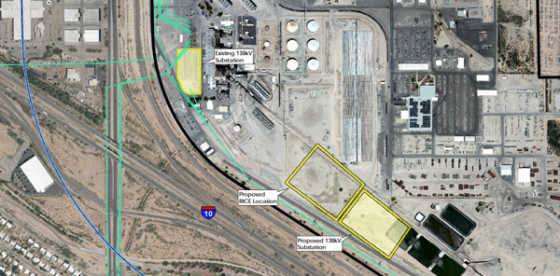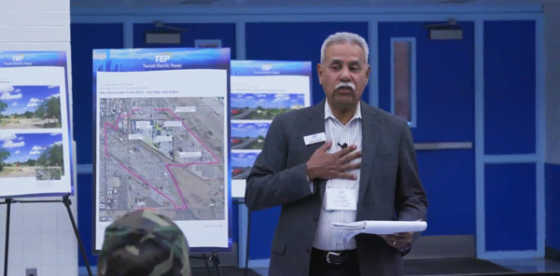Reciprocating Internal Combustion Engine (RICE) Generation and Irvington 138-Kilovolt Transmission Line Relocation
Tucson Electric Power Company (TEP) is installing new natural gas-fired, reciprocating internal combustion engine (RICE) generators and extend existing 138 kilovolt (kV) transmission lines associated with the construction of a new 138 kV substation at TEP’s Irvington Campus, located at South Contractors Way and East Irvington Road in Tucson, Arizona.
These improvements will support TEP’s plans to build new facilities and utilize modern technologies to improve operations, expand its use of renewable energy and maintain safe, reliable and affordable service for customers. The RICEs also will replace aging steam units near the end of their useful lives.
Purpose and Need
Tucson Electric Power (TEP) is working to deliver at least 30 percent of its power from renewable resources by 2030, doubling the Arizona Corporation Commission’s (ACC) 2025 mandate. TEP has enough renewable generating capacity to meet the annual electric needs of about 115,000 homes. Nearly 13 percent of the power delivered to customers comes from renewable resources.
RICE units are designed to compensate for power fluctuations and other challenges associated with TEP’s expanded use of renewable energy. TEP plans to install resilient, fuel efficient RICEs that use natural gas to power up quickly and supplement wind generators and solar panels when conditions for those resources are not favorable. RICE units also can help to meet peak energy demand. New generating resources also will result in significantly lower nitrogen oxide emissions and lower water use.
These flexible, efficient generating units were first identified as part of the company’s long-term resource planning in its Integrated Resource Plan filed with the ACC on April 3, 2017. The transmission lines will be extended southeast to connect with the new substation, which will be built adjacent to the new RICE units.
The Arizona Power Plant and Transmission Line Siting Committee, a committee established by the ACC, reviewed TEP's application during a public hearing held in January 2018 and recommended approval of a Certificate of Environmental Compatibility (CEC) for the project. In March, the ACC voted to approve TEP's application for a CEC.
Arizona Corporation Commission – March 2018
- Order approving RICE Certificate of Environmental Compatiblity
- Order approving Transmission Line Certificate of Environmental Compatiblity
- Meeting transcript
Arizona Power Plant and Transmission Line Siting Committee – January 2018
- Transcripts – January 2018
- Notice of Hearing (filed December 2017)
Prehearing Conference Transcript – January 2018
Application for Certificates of Environmental Compatibility – December 2017
Prefiling Conference – October 2017


